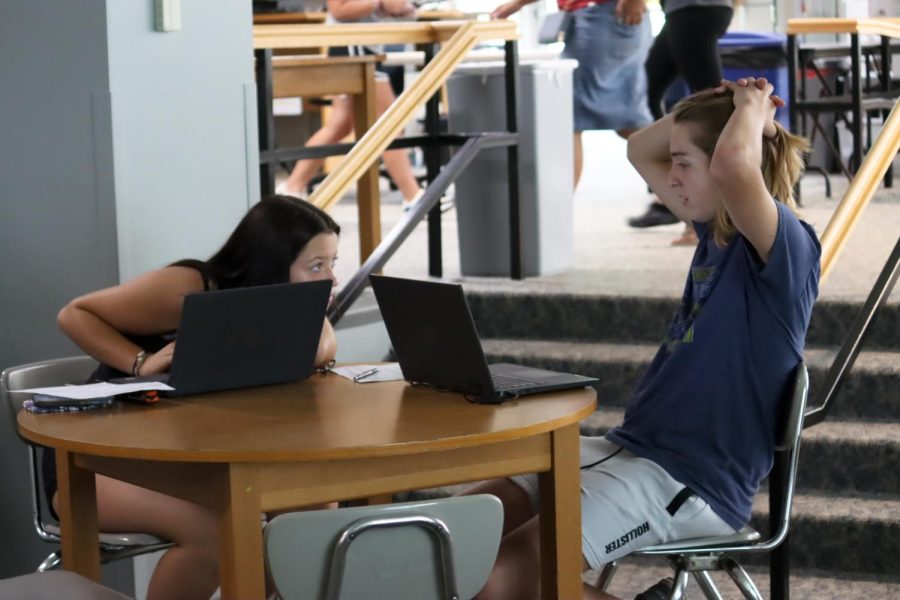How to Start The School Year Right
Photo courtesy of Zachary Kennet
Students looking anxious on the first day of the 2022-23 school year.
August 26, 2022
For some people, the beginning of school sparks joy and excitement. For others, it invokes nothing but an immediate mental decline. Maybe its because they simply don’t like it, but for most, there’s usually a deeper reason.
Especially for incoming freshman, it can be a struggle to manage time when bouncing back between school, extracurriculars, homework, and a job. Ms. Lane, who teaches American literature, debate and public speaking, attributes this to the fact that high schoolers are going through a “transition period in their lives.”
“…all their activities used to be run by the adults in their life and they weren’t independent enough to go many places by themselves or certainly to drive themselves places,” she says. “But high school is a huge change for students.”
She elaborates by saying that, in high school, teachers expect much more from students individually, and how creating new relationships adds a whole “new realm of demands on their mental and emotional lives.”
Her biggest tip for students is to “be realistic” with yourself. Don’t give yourself more than you can handle so you don’t risk feeling discouraged when you can’t get everything done.
“[Getting better at time management] is just like driving—you get better with repeated opportunities to do things well, but it can also be risky to make bad choices,” Ms. Lane says. “Sometimes it works out, but sometimes it doesn’t.”
Another issue that many students face as a result of poor time management is procrastination. Mrs. Baker, one of the many school guidance counselors, thinks the reason students procrastinate so often is because they’ve turned it into a habit and have gotten lazier with every assignment.
And of course, the COVID-19 pandemic has played a role in this. Studies performed by psychologists who write for Frontiers in Psychology, a journal that covers every topic related to psychology, show that students procrastinate more during times of uncertainty. Mrs. Baker says she definitely noticed some changes in students’ work ethic after remote learning and says that it “wasn’t what it used to be” when kids came back to school.
“Remote learning was not conductive enough to keep students on task, as they do not monitor themselves, and if they aren’t disciplined,” she says. “It was easy to not get work done.”
Her advice to students is to tell yourself “You get what you put in.” Reason being, if you don’t put in any effort, nothing good will come out of it.
“It is best to get things done first and out of the way so you can relax and have down time later rather than stressing yourself out by waiting until the last minute,” Mrs. Baker says.
In addition, there’s something that ties these two themes together: anxiety. A survey from the Pew Research Center states that 70% of teens admit that anxiety and depression is a big issue among peers. It seems that specifically in school, there is an array of different things to be anxious about (having people to sit with at lunch, being able to make it to school on time, having multiple tests a day, the list goes on, and on).
Ms. Dinkelmann, a school social worker, says that because of the pandemic, kids are still not used to having school in person. Because of this, they are struggling with building relationships and social interactions. These stressors can cause even more anxiety among students.
“For a lot of students, this year is the first year they are back in the school building having to interact with other students, teachers and administrators,” she says.
In order to reduce that anxiety, a long-term method that Ms. Dinkelmann encourages is having a self-care plan. She classifies this as “finding things to do to take care of your mental health whether that be drawing, listening to music, taking walks, exercising, etc.”
For something quicker, maybe to use in the midst of a test, she suggests the 5-4-3-2-1 method. According to the University of Rochester Medical Center, this method involves acknowledging five things you can see, four things you can touch/feel, three things you can hear, two things you can smell and one thing you can taste.
Naturally, it’ll take lots of time to form these habits. Even though it may be hard to get used to school in the beginning, there are always resources available and people willing to help.












